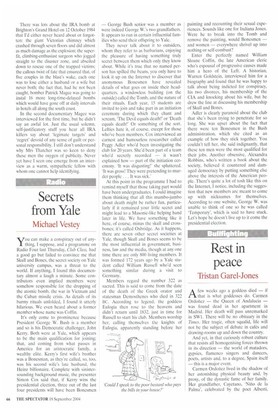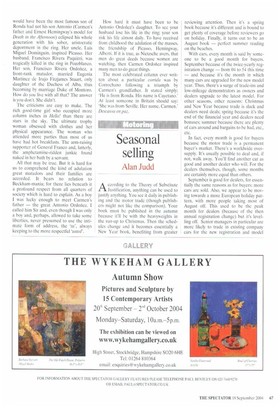Rest in peace
Tristan Garel-Jones
Afew weeks ago a goddess died — if that is what goddesses do. Carmen Ordoriez — the Queen of Andalucia — was found dead in her apartment in Madrid. Her death will pass unrernarked in SW1. There will be no obituary in the Times. Her tragic, often squalid, life will not be the subject of debate in cafés and drawing-rooms up and down the country.
And yet, in that curiously robust culture that resists all homogenising forces thrown in its direction — the world of matadors, gypsies, flamenco singers and dancers, poets, artists and, to a degree, Spain itself — this is a major event.
Carmen Ordoriez lived in the shadow of her astonishing physical beauty and, by proxy, of the dynastic fame of her family. Her grandfather, Cayetano, 'Nino de la Palma', celebrated by the poet Alberti,
would have been the most famous son of Ronda had not his son Antonio (Carmen's father and Ernest Hemingway's model for Death in the Afternoon) eclipsed his whole generation with his sober, aristocratic deportment in the ring. Her uncle, Luis Miguel Dominguin, inspired Picasso. Her husband. Francisco Rivera Paquirri, was tragically killed in the ring in Pozoblanco. Her son. Francisco Rivera Ordofiez, a front-rank matador, married Eugenia Martinez de Irujo Fitzjames Stuart, only daughter of the Duchess of Alba, thus becoming by marriage Duke of Montoro. How do you live with all that? The answer is you don't. She didn't.
The criticisms are easy to make. The rich good-time girl who occupied more column inches in Hello! than there are stars in the sky. The ultimate trophy woman obsessed with clothes and her physical appearance. The woman who attended more parties than most of us have had hot breakfasts. The arm-raising supporter of General Franco and, latterly, the amphetamine-ridden junkie found naked in her bath by a servant.
All that may be true. But it is hard for us to comprehend the kind of adulation great matadors and their families are accorded. It bears no relation to Beckham-mania; for there lies beneath it a profound respect from all quarters of society which is hard to explain. As a boy I was lucky enough to meet Carmen's father — the great Antonio Ordoilez. I called him Sir and, even though I was only a boy and, perhaps, allowed to take some liberties, never presumed to use the intimate form of address, the `tu.', always keeping to the more respectful `usted'.
How hard it must have been to be Antonio Orclotiez's daughter. To see your husband lose his life in the ring; your son risk his life almost daily. To have received from childhood the adulation of the masses, the friendship of Picasso, Hemingway, Alberti. If it is true, as Nietzsche avers, that men do great deeds because women are watching. then Carmen Ordonez inspired many men to do great things.
The most celebrated column ever written about a particular conida was by Corrochano following a triumph by Carmen's grandfather. It stated simply: He is from Ronda. His name is Cayetano.' At least someone in Britain should say: 'She was from Seville. Her name, Carmen.' Descansa en paz.



















































































 Previous page
Previous page